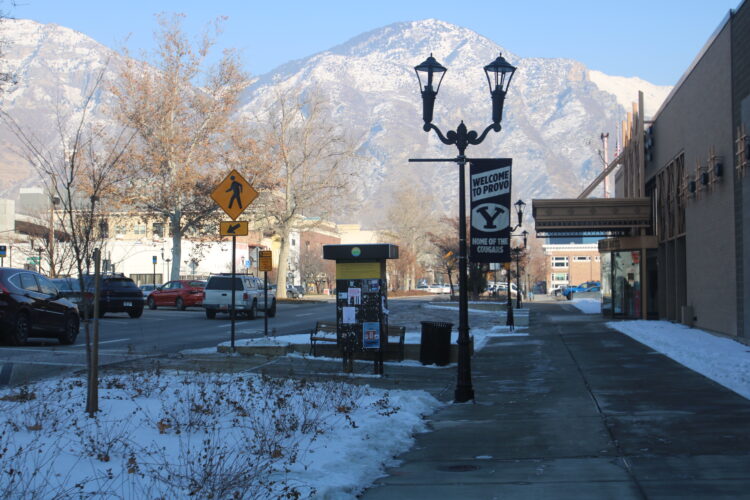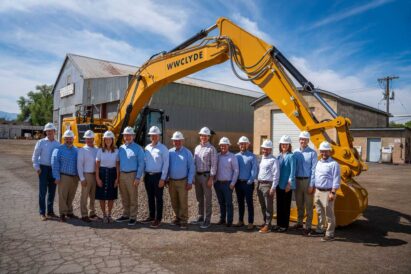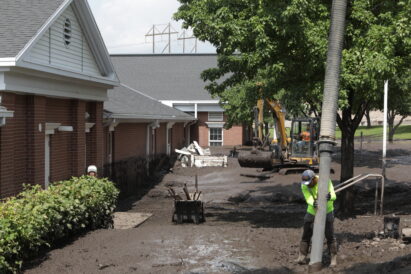Provo City Council approves changes to noise ordinance after alleged complaints and obstacles in enforcement

Curtis Booker, Daily Herald
A portion of Center Street in Downtown Provo is shown on Jan. 29, 2025.Provo residents will have to adhere to a number of changes made Tuesday to the city’s noise ordinance.
During its meeting Tuesday, the Provo City Council took action on the matter, which has been in the works for just over a year.
The changes essentially streamline the process for authorities to enforce the ordinance and standardize noise limits based on the time of the day and specific areas of the city.
City officials have also introduced and revamped the exemption category and are exploring alternative methods to measure noise violations through mobile technology.
The council decided to take a look at the city’s ordinance after two council members inquired about the challenges officers face while attempting to enforce what could be deemed as illegal noise levels and a citizen’s observation that the ordinance lacked a bass limit component.
The council’s office said there had also had been numerous complaints from the area of the city near Brigham Young University.
The council claims that after sifting through five years of police call data, only a small number of the complaints were from people who live within close proximity of LaVell Edwards Stadium.
In a work session meeting last December, Michael Sanders, policy analyst for the Provo City Council, said the majority of the alleged noise complaint calls are in District 5, which includes the Dixon, Timp, Franklin, Franklin South, Downtown, Joaquin, Maeser and East Bay neighborhoods. The complaints are mostly due to loud parties and other activities, per the council’s findings.
“The neighborhoods surrounding the stadium account for only about 3% of the reported noise complaints,” Sanders told the council.
However, sports and various events at BYU and other Provo area schools were a point of contention during the Dec. 17 work session meeting as council members wanted more clarification on exemptions for interschool athletic competitions taking place at a sports venue that is designed for such competitions on school or university campuses during the day or at night.
The updated ordinance exempts all activities that may occur at college and high school athletic stadiums, with some variations.
Official athletic competitions that would likely exceed noise limits will be permitted regardless of the time of day.
“So, if a game between two schools is taking place at a stadium and the game goes past 10 p.m., it is exempt,” said Justin Harrison, executive director for the city council, in an email.
Other noise sources, including a public address system, located on the property of an educational institution and produced as part of any class or event sponsored by the institution are also exempt between the hours of 7 a.m. and 10 p.m.
The previous ordinance listed parades, carnivals, special public social events or special construction projects and some discharge of fireworks as being exempt, but it didn’t list guidance for educational institutions.
At least one BYU student said he feels the ordinance disproportionately affects students and threatens the college town experience.
“Provo thrives as a college town because of its students, and the council has a responsibility to represent their needs alongside those of other residents. I hope you consider these points before finalizing the ordinance,” said Warren Bodily, who lives in Provo’s District 5, during the public comment period of Tuesday’s meeting.
The council also grappled with how to govern loud noises from landscaping equipment.
In the initial proposed draft, sound from landscaping equipment would be exempted between the hours of 7 a.m to 10 p.m. However, the council amended the language to exempt noise from landscaping equipment from 8 a.m. to 8 p.m., which was approved unanimously.
The ordinance lowers continuous or intermittent noise that exceeds the maximum level five or more times within a 10-minute period during the day from 85 to 65 decibels for residential areas, from 85 to 75 decibels for industrial areas, and from 85 to 70 decibels in other areas. Decibel levels vary between the hours of 10 p.m. and 7 a.m. in residential and other areas except industrial, which remain unchanged from daytime levels.
Any violations would be a class B misdemeanor.
The Provo Police Department said the ordinance had not been updated in years and officers faced obstacles enforcing sound laws.
The council’s data findings noted that law enforcement would have to sift through more than 100 options in order to enforce the ordinance; the council has cut that down to just 18.
Sgt. Carter Grow with Provo’s Community Oriented Policing team, who served on a committee that helped advise the council on ordinance revisions, said from the police department’s perspective, the code as it stood was lengthy, difficult to interpret and unclear on evidence needed in order to charge.
“There were also concerns regarding the need for decibel-reader equipment. As a solution, the committee recommended allowing use of a vetted decibel-reader app that would allow each officer to use their cell phone to take noise readings,” he said in a statement sent to the Daily Herald. “This process is being finalized and it is anticipated to be in place shortly.”
The ordinance changes will go into effect once Mayor Michelle Kaufusi signs them into law or within 15 days of the council approving the motion.



